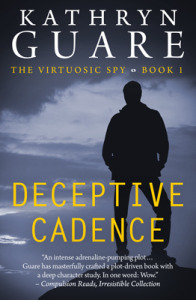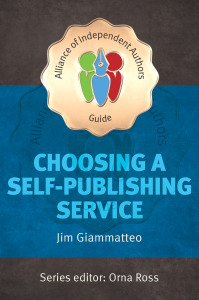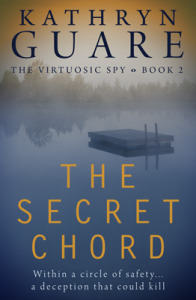With two highly regarded self-published thrillers to her name, ALLi author member Kathryn Guare generously shares her experience of using an assisted publishing service and going completely DIY, to help new authors make the right decisions.
For those just beginning to navigate the landscape of self-publishing, trying to understand the myriad tasks required to transform a manuscript to a printed (and/or digital) book can be like drinking from a fire hose. There are lots of moving parts, but they can be grouped into some basic categories: Editing/Proofreading, Design (cover, interior formatting), Administrative (ISBNS, bar codes, copyright, distribution to retailers, etc), and Marketing (websites, FB pages, advertising, etc.)
The Choices Facing Aspiring Self-publishers
For some people, the idea of having complete control over all the tasks – a truly DIY approach – is self-affirming and exhilarating, but for others it can be overwhelming and paralysing. For my first effort in self-publishing, I fell into the latter category, so like many first-timers I was vulnerable to the exploitative assisted publishing companies that have been superbly documented by the ALLi Watchdog group and in David Gaughran’s excellent blog.
Many of the most disreputable have an approach that is essentially a cheap imitation of the “traditional” publishing structure. In my opinion (not scientific). the people most vulnerable to them are those who still have that traditional model firmly in mind and want something that mimics it, so they end up paying for the privilege of getting bamboozled into bad contracts and useless services that take advantage of their naiveté. I think those less vulnerable are the ones who have a more business-like approach (“I’m creating a product here”) and are simply looking for the services to get it done. Again, I fell into the latter category.
Looking back on my experience, I don’t think I got scammed, but I realize I paid an exorbitant amount of money for services I could do myself (and for my subsequent books, I did do them myself). I paid too much, but I also know that given my level of intimidation, if I’d tried the pure DIY approach I wouldn’t have made it. I’d have given up. Right now, instead of working on the final cover design for my third book, I would have one manuscript in a drawer, gathering dust.
Top Tips for New Authors on Choosing the Best Assisted Publishing Service
So, for the beginners who are like I was, who can’t face scaling the self-publishing mountain without serious professional assistance, let me offer some pointers to help you avoid getting scammed:
-
Stay away from Author Solutions and all its imprints. That’s an easy one. Just don’t. They are notorious.
- If you’re browsing an assisted publishing website and you can’t find any information about pricing, that’s a red flag. Pass them by.
- If you’ve done the first two, and now you are looking for their contract online and can’t find it, ditch those, too.
- Found one with pricing and a contract? Now this:
- Read that contract word-for-word. Mark anything you don’t understand and get somebody (not the company) to help you decipher it. And if it is really short and general, be wary of the things they aren’t saying.
- Do not sign a contract that compromises your intellectual property rights IN ANY WAY. The company should own nothing. You own everything.
- Do not sign a contract that allows the company to take a commission on sales or that parcels out royalties to you. The contract should be a straight-up fee-for-services arrangement. You are paying them to deliver a product, you are not part of their family or club or any other sneaky term they might use to explain why they will take a cut of your profits.
- The contract should allow you to cancel it at any time, and there should be a sliding scale for getting your money back.
- If and when you cancel the contract, it should specify that you get ALL YOUR STUFF, a.k.a. source files. Your cover files, interior formatting files, website files, etc.
- Look on Amazon to see what they’ve published (do an advanced search by publisher) and see what their covers look like – not just the few they put on their website. Also, call them up and ask them to send you a book.
Why You Should DIY Ebooks
Now, before I talk about the pricing pitfalls for the printed book, here’s my very strong recommendation about an ebook: please don’t pay for that in your package. They make a killing on this and you will be able to find someone to help you to do it for way less money. In addition, if the company has uploaded your ebook, you have no control over manipulating its pricing for promotions, or revising your text (adding news of your next book, putting in some links, correcting a pesky typo, etc) or uploading new editions. They’ll have all that control, and you’ll pay them for any changes. This is one area where I feel I got taken for a ride. I paid $799 to have the ebook for my first novel created. For my second, I created it in Scrivener for nothing in about two hours. And it looks awesome.
Avoid Expensive Extras
Now let’s talk about pricing and the “extras” for producing your physical book:
- Try hard not to be lured to higher levels at higher cost. Just stick to the basics. You want a professional cover, formatting, a book you can hold, and a basic means of distribution.
- Editing can be pretty steep and is usually an add-on. Really consider whether you might do better by having a freelancer for this service. Hiring one is a manageable task that even I was able to do my first time out.
- If you are going to add in a website, just get the basic one. You probably don’t know enough yet about what you’d like to do with it, and the higher cost websites aren’t going to add enough value that you’ll be able to use, and your access to the content-management system will likely be very limited.
- Marketing add-ons: don’t buy them. They just cost too much money and mostly are not going to help your sales right out of the gate. You can get a reasonably bright teenager (really, I’m not kidding) to make you a Facebook page and customize your Twitter account, and add you as an author on Goodreads. The other services that will be offered – press releases, invitations to bloggers, etc – they just don’t pay off.
- Don’t pay for the “expanded distribution”. They try to make it sound like booksellers and libraries across the nation are going to see your book in a catalogue and order it for their shelves, but I promise you they are not, unless you’ve managed to acquire huge cyberspace buzz, in which case you wouldn’t be looking at these packages anyway.
Two Final Pointers
- Catalogue everything you are learning along the way, so that you will know not to repeat things that weren’t of value.
- Join the Alliance of Independent Authors and go to its Facebook forum. If you can do this a year before you’re ready to publish, you will learn A TON, and it might build your confidence enough to do more on your own. Even if you still opt for a package, I guarantee that after a few months of soaking in all the learning from the ALLi members, you will realize you never again want to part with hard-earned money for services you can do yourself.
 OVER TO YOU Indie authors, does Kathryn's experience chime with yours? Representatives of assisted publishing services, would you like to share your perspective? All comments welcome!
OVER TO YOU Indie authors, does Kathryn's experience chime with yours? Representatives of assisted publishing services, would you like to share your perspective? All comments welcome!
EASY TWEET When to use an assisted publishing service (and when not to) by @KathrynGuare www.selfpublishingadvice.org/assisted-services/









This is a really excellent and highly informative article, Thanks for sharing.
Hey,
Thanks for the Interesting article, very informative and helpful after the read.
Hey,
Thanks for the Interesting article, very informative and helpful after the read.
Hi,
This was a very interesting read. I agree with most of the points made by you. I would just like to say that I am sorry to hear that you had an unpleasant experience while self-publishing your book. My opinion is that self-publishing as, like a pandora’s box, you never know what you will get out it. Self-Publishing and DIY publishing are probably the only way to publish for many up & coming writers.
As an author, you have to be very informed before choosing a self-publisher. I would like to add a few more pro tips for new authors.
Here are my 3 short tips.
1) Never skimp on editing.
Probably the biggest criticism a book gets is its choppy editing. Always invest in a good editor who can proofread your book.
2) Do not listen to people who say “don’t judge a book by its cover”
The cover is the first thing that a buyer looks at. A good cover can make or break a book. Always invest in a good cover design.
3) Do your market research
Remember you have limited resources, despite this, you have to reach a large audience. Compare packages from different publishers to find a package that fits your needs.
[…] a counterpoint to US indie novelist Kathryn Guare’s thoughtful post before Christmas explaining why she moved from assisted publishing to DIY, English thriller writer […]
This is an excellent and highly informative article, and Kathryn addresses a lot of points that need to be aired if the author services industry is to change and improve. There’s no doubtthat there are many, many rogue companies out there who place profits and hard-selling firmly at the centre of their activities, instead of what’s best for the author. At SilverWood we frequently work with writers who have had a bad experience elsewhere. Many of them simply don’t want to DIY, and are relieved to find a reliable and honest team who genuinely want to help them make the best book possible within their budget.
However, there are a few things authors looking for a good company can be reassured about. Lucy McCarraher has given a really good overview from the publisher’s perspective.
One thing I’d like to add is that a lack of comprehensive pricing on a website probably shouldn’t be an automatic ‘red flag’. Every publishing project is different, and there really is no such thing as an average book or a one-size-fits-all package. A 300-page novel represents a completely different work schedule (and professional skill-set) to a 160-page non-fiction book with epigraphs at each chapter head, 120 footnotes (which each need to be made interactive in the ebook edition), 20 tables or charts, 55 tinted panels of pull-out text, and an index.
A good assisted publishing company will find out about the project by discussing it with the author in detail, working out how best to help that author achieve their aims, and then providing a thorough and informative estimate which may run to several pages. (Also, a good company should say if a work isn’t ready for publication, and may even turn work down or refer the writer to reputable ALLi sources of help.)
Certainly all writers should explore every option open to them and work out what’s best for them and fits with their budget, their other commitments, and their aims for their book.
This is a useful individual perspective. As a traditionally published and indie published author, I agree with much of it, but as a hybrid publisher I have reservations.
Whilst number 1 is spot on, numbers 2 to 8 of the top tips are not useful ways to assess whether a hybrid publisher is reputable, and lack understanding of the industry.
At Rethink Press we show the prices of our standard publishing contracts on our website, but no service or package is agreed without a conversation with the author, and without us having had sight of their manuscript. One-size-fits-all prices are not the sign of a reliable hybrid publishing company. Likewise, displaying a standard contract on the website is no guarantee of good practice or even informative to authors. We prefer to talk to authors first, assess their needs and discuss the contract with them personally. Of course they should then review the details themselves and/or take other advice.
Companies that simply provide book production services have no reason to share royalties with authors, but hybrid publishers are just that – publishers. They invest their time and skills in a title, provide ongoing admin, overhead costs and support to their published authors and need to recoup these through a percentage of royalties. Because the author pays up front for services, the publisher’s share should be much less than that taken by a traditional publisher.
Finally, professional editing is never an “add on”. Any author who wants their book to look and read to industry standards should invest in a professional edit and cover design as a basic minimum. As for “expensive”, on the whole you pay for what you get.
The most important tips for finding a good hybrid publisher is to talk to a decision-maker, feel confident that they have in depth knowledge of books and publishing, are transparent about their costs and processes, create a package which suits you and your book, and never try to upsell you on any service you don’t need or want.
My route into an arrangement with SilverWood Books came from a recommendation from the friend of a friend, and independent research.
Writers and Artists have a service where you answer a questionnaire that finally provides a list of organisations that might best suit your need. SilverWood was on this list, and was the first to respond to the automatically generated email. That was the only automatic thing about SilverWood – from the very first response from Helen Hart, their approach was tailored to me. However, I still went to lengths to understand what other companies offer, and whittled my choice down to two, before selecting SilverWood. Of course, I could have just gone with my friend’s recommendation !
Who knows what I’ll choose to do in the future, but as I look forward to publication of my first book, I’m comfortable to be led by a very experienced and we’ll thought of professional ‘hand’.
When I began my indie author journey I didn’t even think about using an assisted publishing company because I had my first children’s book published by a subsidy publisher and felt I got diddled by them so wasn’t going that route again. I only pay for editing and cover designs, things I know I can’t do properly myself.
Have you or anyone you know had any negative experience with iUniverse? I seem to be having trouble with their return phone calls.How about Outskirts Publishing?
I’m just getting started and I feel the self-publishing area is rife with deceit, unspoken cost to an author.
Thanks,
Bob
Bob, ALLi’s Watchdog, Giacomo Giammatteo, is constantly investigating troublesome companies and he is the best person to speak to about this – please feel free to contact him directly. But I can tell you straight off the iUniverse is definitely one to avoid because of its association with AuthorHouse, notorious for bad practice and author exploitation. Also read ALLi’s terrific guidebook, “How to Choose A Self-publishing Service” and it will save you a lot of headaches.
Bob, another good tip is to Google the name of a company you’re thinking of dealing with along with the word “complaints”. It can be very telling!
I like independent publishing for the same reasons as you do. My new novel, Two Wrongs is out now thanks to the help I got from Create Space, Amazon and Kindle select.
I have several other projects awaiting attention; it is satisfying to know that nobody can tell me how or when. I drive my-self, my passion, my time; there’s a good deal of satisfaction in that.
Thanks for the article.
Larry.
Thanks for the article, it’s definitely something worth talking about and probably something worth visiting time and time again as things develop and mature. I agree with a lot of your top tips, although for me they’re a little too focussed on the contract and not enough on the softer side of a business relationship. Also, because it’s time I lack, I’m more inclined to ‘outsource’ as much as possible rather than learn how to do things myself. That said, I can’t afford a PR or marketing company so that’s firmly in my court.
Like you I had a bad experience on the road to publishing my first novel, although reading between the lines I think mine was bad in a different way. I used an excellent editing service to polish my manuscript and having decided to self-publish I was in the same bamboozled situation as you describe – I agree that being a member of ALLi at that point would have helped, but I didn’t know enough to know it existed.
So, for anyone reading this who’s new to self-publishing, here’s my thoughts. I have pondered long and hard about why I had a bad experience and now, with the benefit of being able to compare it with a good experience, I’ve come to the conclusion that it was mainly because I wanted to work in a much more business like way than they were set-up for; everything was too reliant on one person juggling multiple contracts and performing multiple roles. For example: it was impossible to get a schedule and therefore a planned release date which of course is vital to any pre-release promotions; they only worked with one wholesaler which limited the booksellers that would stock my book; and I was made to feel stupid and naive for wanting the things I wanted (I was naive but I’m not stupid). After an agonising few months it all came to a head and I decided to cut my losses. In contrast, SilverWood Books were able to give me a planned release date (with caveats of course) and they treat me as a grown-up who’s new to this and needs guidance, but isn’t stupid.
I have no experience of traditional publishing so it’s hard to compare, but what I like about self-publishing is that I’m always in control, I retain ownership and I actually quite like the fact that I’m the one taking the financial risk. This is all possible if you have a good working relationship with a service that offers a broad range of options that you can pick and choose from when you need them.
If I had to give a top tip it would be to invest time up-front to find the business relationship that works for you and to trust your instincts about who you can and can’t work with.
Kathryn – thanks for the post and the opportunity to comment, which was a bit long but I hope it was useful…
I agree with most of the above – but not all assisted publishing companies are sharks to be avoided. I’ve been on both sides of the fence, so have experienced the very good and the very bad (and I am mainstream published so have that experience as well!)
First – I prefer my Indie books to my traditionally published ones because I have control over them. If there’s a typo error I can almost instantly have it put right. I decide the covers, I decide everything (which can have a downside, because sometimes good help and advice is needed!) My mainstream published books – well, to be honest I am not that happy or proud of them. They need redesigning and re-editing, but I will not be able to do this.
Second – PROFESSIONAL editing is The most important issue, with presentation a good second. I am the Managing Editor for the Historical Novel Society Indie Reviews – most of the indie books we reject are badly to not at all edited, and are printed with the text left-justified, or double spaced – or in comic sans. Fine if that is how you want your book to look, but not fine if you want to be taken seriously as an author every bit as good as mainstream. For e-books, yes of course you can do it yourself much cheaper – but do you know how many e-books look shabby and unprofessional because they have been incorrectly formatted? Sorry, but I want to read an e-book that looks every bit as quality as any mainstream novel. I don’t want page numbers or formatting marks half way down the page because the author has skimped on cost and made a mess of it. Do it yourself by all means – but do it properly!
Third – yes some assisted companies can and do rip you off. Been there, done that. All the above advice is good and solid – but know what the best thing you can do to check out a company? Ask the authors they have already published. And not just one or two – the more the better. If the company you are looking at doesn’t provide details of their authors – including links to websites etc, then very probably it isn’t a good company. The good ones are proud of their authors! Google search for the company – how often does it crop up with good reviews? How often does it crop up with references to various concerns?
Fourth – The good companies are superb. I’m with SilverWood Books Ltd, best move I ever made was when I switched to Helen Hart and her dedicated team. My books are professionally produced, the company is efficient and dedicated. Another thing to keep in mind, does the company you are considering going with take everything they get sent, or do they reject the not so good books? If everything, treat with care. For Historical Fiction writers, go to the Historical Novel Society website and look for the Indie Reviews, in particular the Editor’s Choice selections. Don’t worry about the review, look for the publishing company that produced the book. It’s pretty obvious which ones are the better ones.
Basically, the good companies shine. The poorer ones don’t.
Great post, Kathryn.
It is a difficult journey trying to find the right partners for this business of publishing. I always like to look for the telltale signs–how does a company earn its money? If it’s a distributor you’re looking at, or a promotional service…etc. I like to see it come from results of your increased sales, not from your pocket. Smashwords and Draft2Digital do this perfectly, charging nothing for services and banking on your sales for their percentage.
Thanks for sharing.